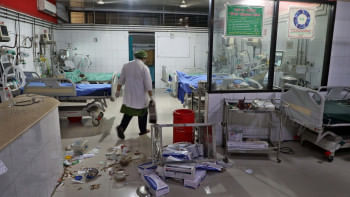Gazi factory fire: A wake-up call for intelligence reform

The Gazi factory fire tragedy represents a severe setback to the progressive transformation of Bangladesh. On a number of occasions, the country has faced failures within its intelligence services, creating the impression that our intelligence agencies are not effective enough at preventing such tragedies.
Golam Dastagir Gazi's arrest was highly publicised, making it reasonable to expect some form of untoward incident at his establishments—including subversive activities—in its aftermath. However, our intelligence agencies failed to anticipate any such plot and did not provide law enforcement agencies with early warnings that could have enabled preventive actions.
There may have been coordination in the fact that miscreants first looted and vandalised the factory before setting it on fire. It's possible that intelligence failed both in the surveillance of underground networks and in identifying any criminal group capable of planning an attack of this magnitude.
The speed at which the fire and violent looting occurred after Gazi's arrest suggests there may have been incitement to violence. Hours after the looting began, around 9pm at night, the miscreants set a fire inside the factory. It is obvious, even to a layperson, that this violent behaviour may have been prearranged rather than a spontaneous outburst. Clearly, this indicates that our intelligence services were not monitoring for any signs of violent provocation or mobilisation efforts by the miscreants.
The large group of individuals that stormed the factory, in retrospect, appears well-coordinated, suggesting that their actions were planned. From an intelligence perspective, the deliberate targeting of a factory connected to a former minister could potentially be exploited by foreign groups to destabilise our new interim government. Even if there is currently no concrete evidence of outside influence or diplomatic interference, the intelligence agencies should not dismiss such a possibility.
Unfortunately, the lack of detected factors or consideration of such possibilities indicates a gap in our intelligence efforts.
Intelligence agencies cannot rule out the possibility of sectarian motives fuelling the unrest. As of today, we have no concrete information from published sources on this issue. This suggests that our intelligence organisations are not fully engaged in their professional duties. It should be the task of intelligence agencies to monitor how political events might trigger or intensify underlying social divisions, including sectarian agitation.
A large number of individuals were involved in the looting and arson. There may have been political patronage networks that mobilised people in response to the arrest. An army team arrived at the scene but did not stay long, which suggests a reluctance to engage.
The individuals rescued from the site of looting and arson were not factory workers but looters, indicating they were likely misled by rumours of easy gain. The ideal role of an intelligence agency would be to counter the spread of harmful information or disinformation that could provoke violence.
Finally, it's possible that the looters, not being factory workers, were part of a larger criminal organisation exploiting the situation. The emerging stories suggest that looting was their primary motive, followed by arson, possibly linking criminals with political actors. Given the current state of law enforcement gaps in Bangladesh, intelligence services should have been proactive in detecting and disrupting these connections. Sadly, that was not the case.
The failures exposed by the Gazi tragedy are not just lapses in operational efficiency, they paint a very concerning picture of our intelligence effectiveness. For far too long, these agencies were misused to threaten lives through forced disappearances, serving the interests of political regimes rather than the people. The time has come for a profound transformation. We need to build a patriotic and proactive intelligence and security apparatus capable of preventing and addressing crises before they escalate. The future of our nation depends on it.
Maj Md Badrul Alam Siddiqui (retd) is the head of operations at Millennium Certis Security Bangladesh Ltd.
Views expressed in this article are the author's own.
Follow The Daily Star Opinion on Facebook for the latest opinions, commentaries and analyses by experts and professionals. To contribute your article or letter to The Daily Star Opinion, see our guidelines for submission.

 For all latest news, follow The Daily Star's Google News channel.
For all latest news, follow The Daily Star's Google News channel. 










Comments